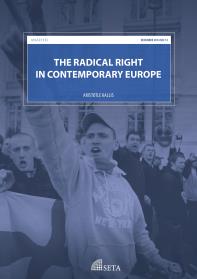The family of the radical right is enjoying a prolonged spell of electoral and most importantly political ‘success’ in Europe. Established (though constant¬ly adapting) parties and new movements, from a variety of backgrounds and with different political trajectories and ideological profiles, have gradually come to represent a combined, formidable challenge to the ‘mainstream’ political system and society. Since the turn of the new millennium in particular, heightened existential insecurity and popular anxiety about identity and welfare have created an even more fertile ground for the radical right’s populist message. More alarm¬ingly, however, some of its key themes (in particular anti-immigrant, anti-Islam, anti-establishment, anti-EU critiques) have gradually become ‘mainstreamed’ – that is, accepted by large sections of society and adopted by ‘mainstream’ politi-cal discourse, thus blurring conventional boundaries between ‘extremism’ and the ‘mainstream’. This study explores the political itineraries, ideological characteris¬tics, and current strategies of the radical right in Europe, as well as the responses of ‘mainstream’ actors to it. This is an analysis that sees the success of the radical right not only as a critical challenge to, but also as a complex problem of, ‘mainstream’ politics and society.


